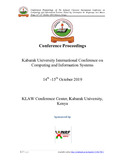Agent Based Computational Model For Memory Retention: A Focus On Children With Dyslexia
Abstract
Memory retention can be defined as a process by which both working memory and long
term memory preserves knowledge so that it can locate, identify and retrieve it in the future.
Children with dyslexia suffer from lack of memory retention. They suffer from reduced
mental ability, which affects the series such language acquisition, mathematical difficulties
and many more. Different interventions have been implemented using computing
technologies to aid memory retention among the dyslexic children. Computing techniques
such as gaming, assessments and motivation are employed to improve the reading and
spelling skills of learners. Unfortunately the computing techniques tend to address either
one or the other of these needs being either enabling or instructional. Such computing
technologies up to now, have not been designed to respond to personalized feedback from
the learner and to personalize the system in line with the user’s performance. In view of
this, the paper discusses, the use of Intelligent Agents that will help design an adaptive
learning support system together with key memory strategies to enhance memory retention.
This study will design an Agent-based computational model that will be implemented using
a computational tool that will be used by dyslexic learners. The computational tool will be
used to test grade 3 students in a school in Nairobi County. Data will also be collected using
a questionnaire. Results from the computational tool will be analyzed using descriptive
statistical techniques.

